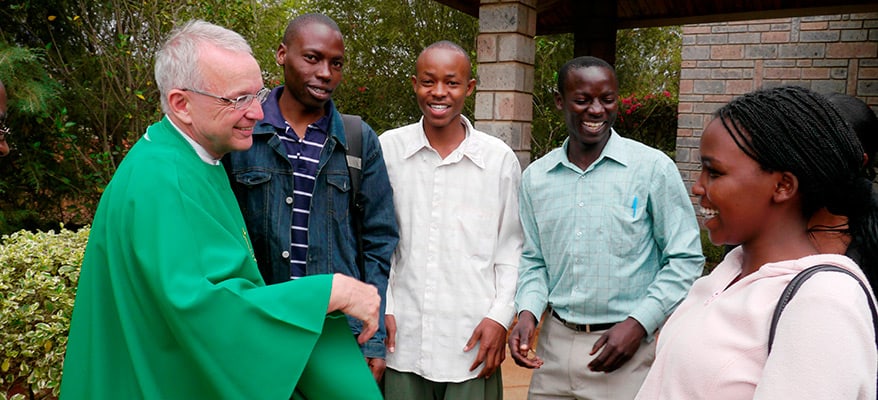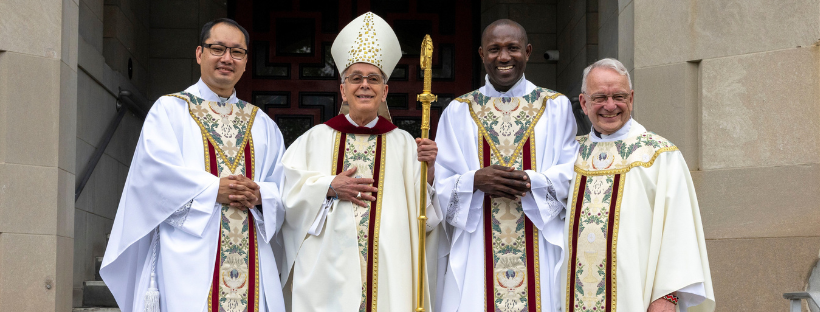Stories of Mission
Be Not Afraid, Journey of Faith
By James H. Kroeger, MM What is the opposite of “faith” in the sacred scriptures? Many responses are possible: doubt, disbelief, mistrust, uncertainty, hesitation, skepticism, apprehension. You might even assert that the antonym of “faith” is “fear.” To be...
Easter Encounters with the Risen Lord, Journey of Faith
Today we celebrate the Resurrection, the greatest of our Church’s feasts. That makes it the perfect opportunity to think about what I call “faith encounters.” There is a rich variety in the different Evangelists’ scriptural accounts of that first Easter. ...
Rising, Learning from Women’s Leadership in Catholic Ministries, Interview with Carolyn Y. Woo, PhD
Robert Ellsberg sits down with Author, Carolyn Y. Woo, to discuss Rising, Learning from Women’s Leadership in Catholic Ministries. Through reflection on first-person narratives of a range of women involved in leadership positions in Catholic ministries (social...
Walking in Solidarity with Jesus, Journey of Faith
Walking in Solidarity with Jesus On Palm Sunday we begin our intimate Holy Week journey with Jesus. On this occasion I recall a moving experience from the Philippines, where I spent 52 years in mission. It was during the visit of Pope Francis in January 2015. He...
Supplement your faith with virtue, Journey of Faith
“For this very reason, make every effort to supplement your faith with virtue, virtue with knowledge, knowledge with self-control, self-control with endurance, endurance with devotion, devotion with mutual affection, and mutual affection with love. If these...
An Easter Message from Maryknoll Fathers and Brothers, from Fr. Lance Nadeau, M.M.
Hello everyone, my dear brothers and...
Martin Luther King and The Trumpet of Conscience Today, Interview with Régine Michelle Jean-Charles
Martin Luther King and The Trumpet of Conscience Today wrestles with the parts of King’s vision that have historically been the most uncomfortable for white Americans. The lectures that comprise “The Trumpet of Conscience” are a powerful critique of the triple...
Earth Day – April 22nd
Earth DayCare of Creation Africa - KenyaFr. John Waldrep, M.M.The reforestation project will take place in 20-30 outstations of St. John the Baptist Parish. Two types of drought-resistant trees will be planted. The trees will bring various nutritional and...
One does not live by bread alone, Journey of Faith
“Filled with the Holy Spirit, Jesus returned from the Jordan and was led by the Spirit into the desert for forty days, to be tempted by the devil. He ate nothing during those days, and when they were over he was hungry. The devil said to him, ‘If you are the Son of...
What Makes Education Catholic: Spiritual Foundations, Interview with Thomas Groome
In this readable and timely work, Thomas Groome explores the basis of Catholic education, from the historical Jesus to figures like Augustine and Aquinas, Angela Merici, Elizabeth Seton, and Mary Ward. Groome shows how these foremothers and fathers of Catholic...
The Supreme Good of Knowing Christ Jesus, Journey of Faith
“More than that, I even consider everything as a loss because of the supreme good of knowing Christ Jesus my Lord. For his sake I have accepted the loss of all things and I consider them so much rubbish, that I may gain Christ and be found in him, not having any...
First Sunday of Lent, Journey of Faith
“So whoever is in Christ is a new creation: the old things have passed away; behold, new things have come.” 2 Corinthians 5:17 Imagine for a moment an archbishop voluntarily living as a homeless man. In the inspirational novel The Homeless Bishop by Joseph E. Girzone,...
Preparing for Lent, Journey of Faith
“No disciple is superior to the teacher; but when fully trained, every disciple will be like his teacher.” Luke 6:40 Lent is days away now. So I turn my humble thoughts on preparing for the miracle of Easter… When Socrates was on trial for impiety, he was famously...
The Power of Forgiveness, Journey of Faith
“I give you a new commandment, says the Lord; love one another as I have loved you.” John 13:34 Today’s Gospel is a tall order. Love your enemies, turn the other cheek, and if someone takes your cloak, give them your tunic as well. Reminds me of John Lennon’s...
The Cost of Discipleship, Journey of Faith
“Blessed is the one who trusts in the Lord, whose hope is the Lord.” Jeremiah 17:7 Easy to find solace in today’s Gospel, the Sermon on the Mount. Jesus addresses a great crowd with words we call the eight Beatitudes, virtues sure to transform and bless us on our...
The Gift of Purpose, Journey of Faith
"But by the grace of God I am what I am, and his grace to me has not been ineffective." 1 Corinthian 15:10 I think of today’s readings as a gift. Rarely do all three scriptures have a unifying theme, but this Sunday they do, perhaps a gift for the preacher—meaning...
Resurrection Hope, Interview with Kelly Brown Douglas
“How do we really know that God cares when Black people are still getting killed? How long do we have to wait for the justice of God? I get it, that Christ is Black, but that doesn’t seem to be helping us right now.” These questions from her son prompted theologian...
Take up The Challenge, Journey of Faith
“If I speak in human and angelic tongues, but do not have love, I am a resounding gong or a clashing cymbal.” 1 Corinthians 13:1 Charity begins at home. At least that’s what the Nazarenes thought about the doings of their favorite son. They wanted Jesus to work a...
The Sanctity of Human Life, Journey of Faith
Today this scripture passage is fulfilled in your hearing. Luke 4:21 Jesus, as we know, was a very great teacher and preacher. During his public years, he attracted crowds throughout Galilee as he taught in synagogues throughout the land. The crowds, St. Luke tells...
Totally Forgettable Wedding Feast, Journey of Faith
“They have no wine.” John 2:3 In Africa, weddings re crucial, fateful, far-reaching, revelatory social events. They are not merely joyful private, personal celebrations, but momentous cosmic communal actions. A marriage binds together the visible and invisible...
Worthy Servants, Journey of Faith
“I, the Lord, have called you for the victory of justice; I have grasped you by the hand.” Isaiah 42:6 Sometimes, when I read Scripture, the meaning is crystal clear. Other times, I find myself asking questions. This week’s Gospel has prompted me to do that once...
Always Welcome, Never Ungenerous, Journey of Faith
“And behold, the star that they had seen at its rising preceded them, until it came and stopped over the place where the child was.” Matthew 2:9 Occasionally unexpected. Always welcome. And never ungenerous. That’s how I think of God’s presence in my life. Epiphany...
Celebration of Hope or Love and Forgiveness, Journey of Faith
“Son, why have you done this to us? Your father and I have been looking for you with great anxiety.” Luke 2:48 Yesterday, the Nativity of Our Lord, was a great family day for many, packed from beginning to end with tradition and celebratory moments. Most of us find...
The Grace of Mission, Journey of Faith
“Blessed are you who believed that what was spoken to you by the Lord would be fulfilled.” Luke 1:45 The women in Luke’s Gospel always amaze me. The two I remember today with affection are Mary and Elizabeth—devoted cousins, faithful servants of God, and expectant...
Maryknoll Prayer Guild, December 2021
O wondrous night, when you,Almighty and Eternal God,came to earth as a baby anddwelt among us as a human!You restored the human raceto the dignity lost in Edenand raised it further stillby Uour glorious Incarnation. O blessed day, dawning on a peoplewho walked in...
As Seasons Change So Too Does Service To God’s Mission Of Love And Compassion That Add Creativity And New Life!
Maryknoll missionary priests and Brothers have been serving in countries throughout Africa, Asia and Latin America for 104 years now. Traditionally, we had only accepted men from the United States to join us and they knew they would be sent outside the U.S. for...
Maryknoll Brothers In Mission
Brothers Ryan Thibert, Joe Bruener & Jonathan Jose in Cochabamba, Bolivia What is a Catholic Brother and what does he do? The best example of a “Brother” would be Jesus himself. Jesus lived most of his life as a “Brother”. He was single, was a person of...
The National Catholic Youth Conference November 18 – 20, 2021 Indianapolis, Indiana
Vocation Director Fr. Rodrigo Ulla (center) with two friends From November 17 to the 20th, the Vocations Team led by Mr. Greg Darr and Fr. Rodrigo Ulloa traveled to Indianapolis to attend the 2021 National Catholic Youth Conference most known as NCYC. We had a booth...
A Return And Warm Welcome In Tanzania
Fr. Mike with the present chaplain and students during a reception outside the chapel Fr. Mike Snyder has spent his missionary career among the people of Tanzania in East Africa. Today he serves in vocations and as Maryknoll’s Director of Admissions. Recently he...
Vocations Facebook Page
We understand that not everyone is a Facebook user. However, if you take the time to visit us on Facebook (https://www.facebook.com/mklvocations) you will find several short video testimonies of Maryknoll Missioners speaking about their vocations and experiences in...



